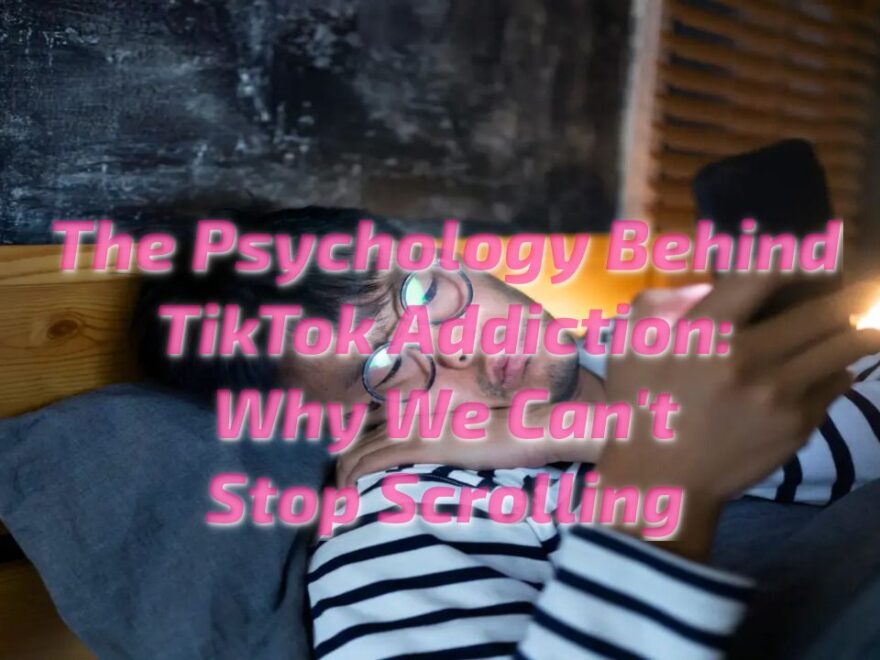TikTok, the immensely popular social media platform, has taken the world by storm. With its addictive short-form videos and endless scroll, it has captivated millions of users, often leading to hours of mindless scrolling. But what is it about TikTok that makes it so addictive? The answer lies in the psychology behind our addiction to this platform.
The Platform’s Algorithm

One of the primary factors contributing to TikTok addiction is the platform’s algorithm. TikTok’s algorithm is designed to learn your preferences and tailor the content you see to keep you engaged. It uses artificial intelligence to analyze your behavior, including the videos you watch, like, and share, as well as the time you spend on each video. This personalized content delivery creates a sense of novelty and excitement as you constantly come across new and interesting videos that align with your interests. This constant stimulation and anticipation of finding something entertaining keep users hooked and eager to continue scrolling. If you are just a debutant on TikTok and want a bigger audience, here you can get views on TikTok.
Concept of Social Validation
Another psychological factor at play is the concept of social validation. TikTok is built on a culture of likes, comments, and shares, which act as social currency. When users post a video, they eagerly await the response from their followers. Each like and positive comment triggers a release of dopamine in the brain, reinforcing the behavior and making users crave more. The desire for validation and recognition drives users to create and consume content compulsively, seeking instant gratification and validation from others.
User Interface

Moreover, TikTok’s user interface is specifically designed to promote addictive behavior. The endless scroll feature allows users to keep scrolling through an infinite feed of videos without any natural stopping point. There’s always something new to discover, and the auto-play feature ensures that videos start playing as soon as you finish one, eliminating any pause or reflection time. This continuous stream of content makes it easy to lose track of time and get absorbed in the TikTok experience for hours on end.
Format of Short Videos
The format of short videos on TikTok also plays into our psychology. Research has shown that our attention span has been decreasing in recent years, and TikTok’s bite-sized videos perfectly cater to our limited attention spans. These quick bursts of entertainment are easy to consume and provide instant gratification without requiring much cognitive effort. Users can easily find themselves caught in a loop of watching one video after another, as each one only demands a few seconds of their time.
FOMO
Furthermore, TikTok thrives on the fear of missing out (FOMO). The platform’s content is constantly changing and evolving, with new trends, challenges, and viral videos emerging every day. Users fear that if they don’t stay up to date and keep scrolling, they might miss out on the next big thing. This fear of missing out acts as a powerful motivator to keep users engaged, as they don’t want to be left behind or feel out of the loop.
Escape from Reality

Lastly, TikTok addiction can be attributed to its ability to provide an escape from reality. In an increasingly fast-paced and stressful world, TikTok offers a convenient way to disconnect from our problems and immerse ourselves in a world of entertainment and creativity. The endless scroll becomes a form of escapism, providing temporary relief from boredom, anxiety, or other negative emotions.
Conclusion
In conclusion, the psychology behind TikTok addiction is multifaceted. The platform’s algorithm, social validation, addictive user interface, short video format, fear of missing out, and escapism all contribute to the irresistible urge to keep scrolling. Understanding these psychological factors can help us become more aware of our behaviors and develop healthier habits when using social media platforms like TikTok. It’s essential to strike a balance between enjoying the entertainment it offers and maintaining control over our screen time to ensure our well-being and productivity in the real world.
